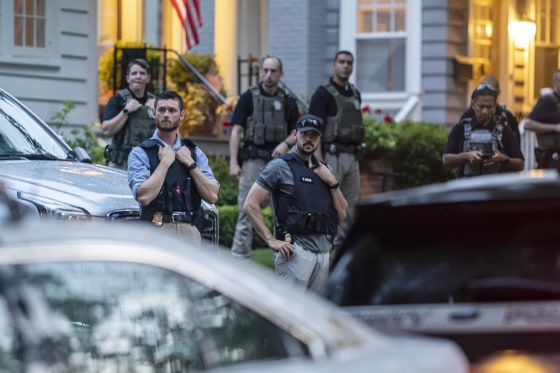WASHINGTON — The House approved Senate-passed legislation Tuesday that would provide security to family members of Supreme Court justices, sending the bill to President Joe Biden nearly a week after an armed man was arrested outside Justice Brett Kavanaugh's house.
The legislation passed the House in a 396-27 vote. All the "no" votes came from Democrats.
Proponents argued that the incident outside Kavanaugh's Maryland home last week called for urgent action.
"Supreme Court justices shouldn’t be subject to intimidation and violence,” Rep. Morgan Griffith, R-Va., tweeted after the vote. “I voted to expand security for them and their families so they can do their jobs. It’s disgraceful that 27 Democrats voted no even after the attempted assassination of Justice Kavanaugh.”
In the incident outside Kavanaugh’s house, 26-year-old Nicholas Roske of California was arrested and found armed with a handgun, a knife, pepper spray and burglary tools. He said in a 911 call that he came with the intent of killing Kavanaugh because of the leaked draft opinion suggesting the high court planned to overturn Roe v. Wade. Law enforcement agencies have been warning about potential violence in advance of the official opinion expected to be released in the next few weeks.
Roske said last week on the call to 911 that he found Kavanaugh’s address by looking at images that were shown in the media. After the leaked draft of the abortion opinion came out in early May, protesters demonstrated outside several justices’ homes including Kavanaugh, Chief Justice John Roberts and Justice Samuel Alito, who wrote the leaked draft.
Rep. Veronica Escobar of Texas, who was among the Democrats opposing the measure, referenced abortion clinics in arguing that the bill would extend protections to justices' family members instead of “health care providers and patients and staff who are vulnerable everyday especially because of the actions of this Supreme Court.”
The Supreme Court Police Parity Act, sponsored by Sens. Chris Coons, D-Del., and John Cornyn, R-Texas, would provide security that's similar to protections that currently exist for family members of certain executive and legislative branch officials. The Senate passed the bill last month with unanimous support.
An advisory from House Majority Leader Steny Hoyer, D-Md., late Monday said the House would vote on the Senate-passed measure after House Democrats had been considering a slightly different version that would have extended security protections to Supreme Court employees as well.
Senate Minority Leader Mitch McConnell, R-Ky., on Monday threatened to block that version in the Senate.
"The right bill passed the Senate, we’re not going to pass this House bill if it comes over,” McConnell told reporters Monday afternoon, "They need to take up the Senate bill that Senator Cornyn sent them and pass it."
When the bill passed the Senate, Hoyer said, "We believe that it is critical to safeguard the families of those who choose to serve their country and their communities as judicial clerks and staff as well."
McConnell, however, said the protections should not go to "nameless staff that no one knows."
Before the vote Tuesday, Hoyer said he was "surprised" by the opposition to a House bill that would extend protections to Supreme Court staff. "I can’t really give you an explanation because adding employees doesn’t seem like a very controversial thing to do," he told reporters.

